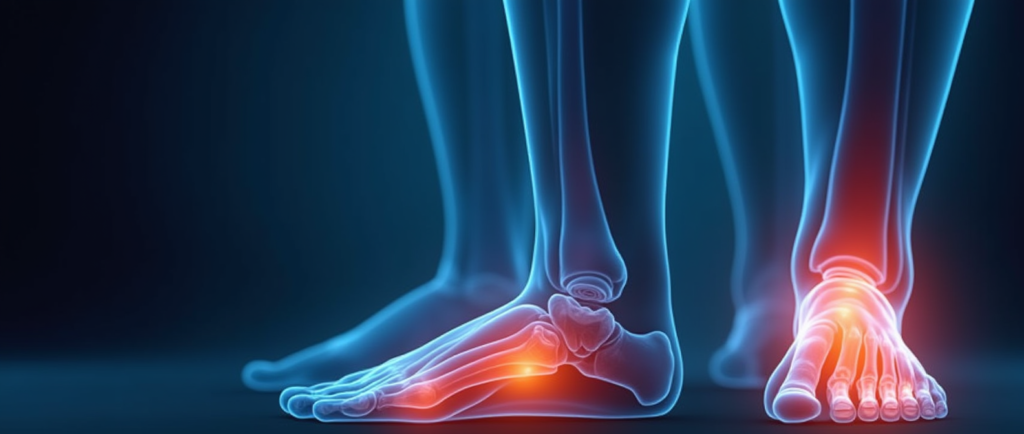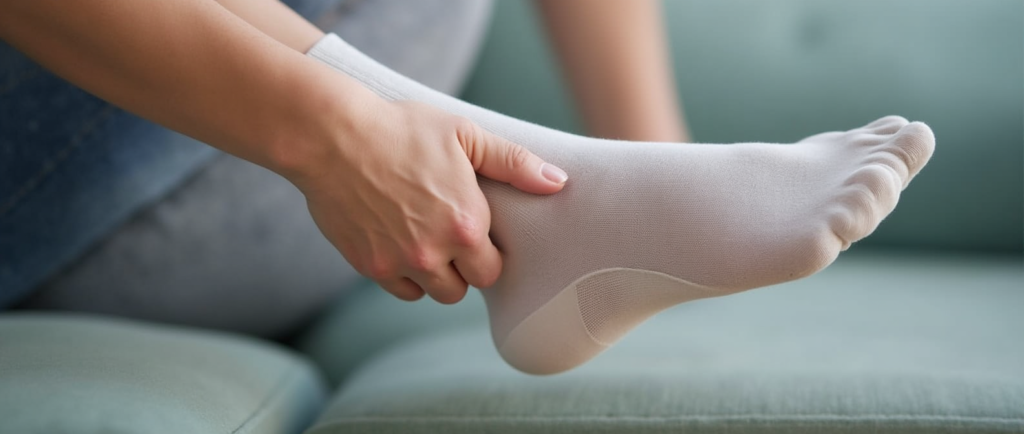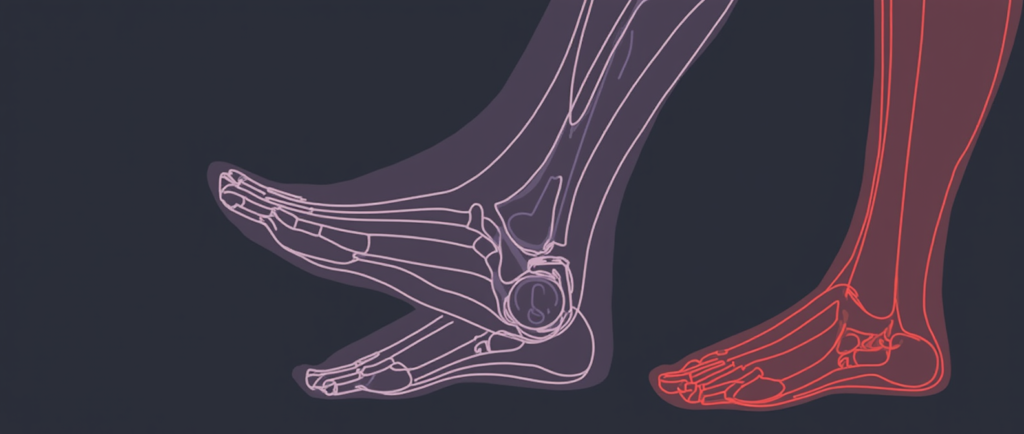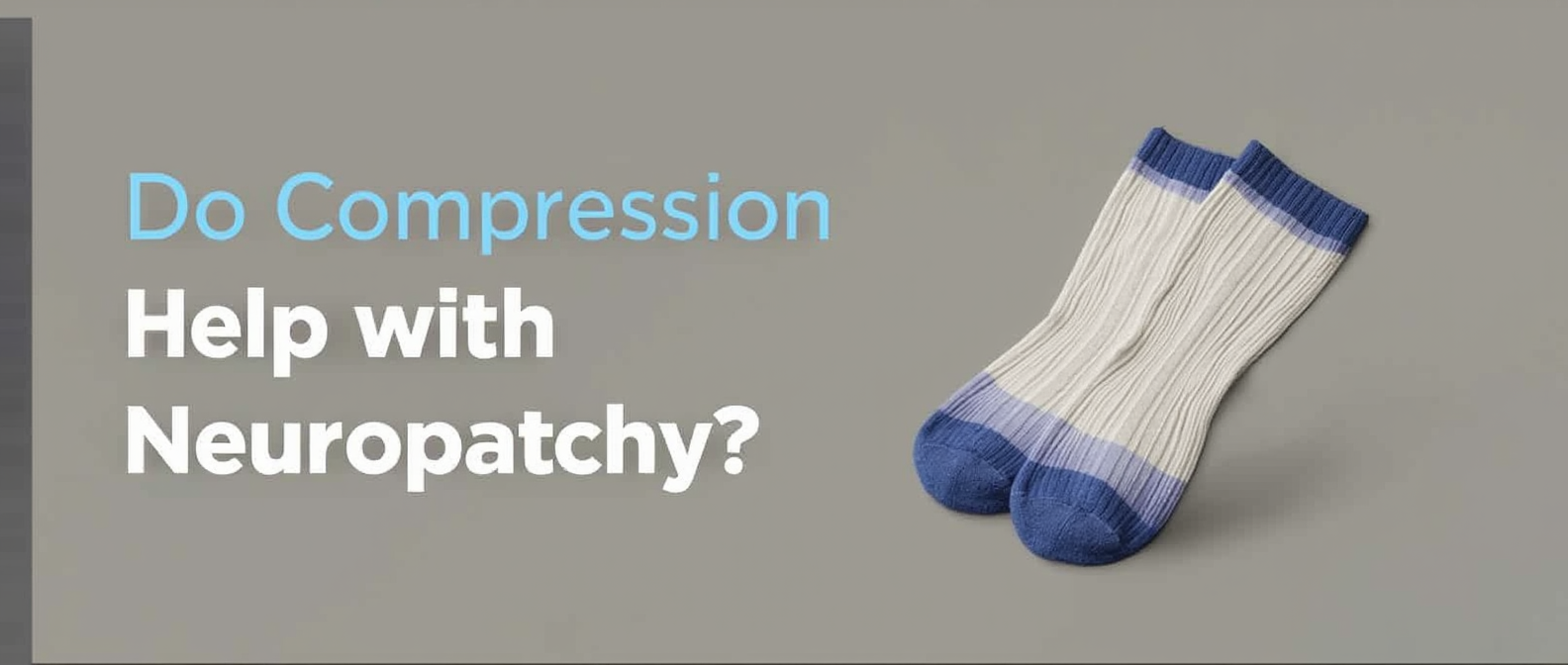Did you know that about 30 million Americans have neuropathy? This condition causes pain, numbness, and movement difficulties. Do compression socks help with neuropathy? Discover how they may offer relief and improve comfort for those affected.
Many people with neuropathy try compression therapy to ease their pain. They wonder if compression socks can really help. Let’s look at the science and what others say to find out if it works.
Table of Contents

Understanding Neuropathy and Its Impact on Daily Life
Neuropathy is a condition that damages or disrupts the peripheral nerves. It can greatly affect a person’s daily life. This nerve disorder is often linked to diabetic neuropathy or other nerve problems. It causes a range of symptoms that can lower one’s quality of life.
Common Symptoms and Challenges
Those with neuropathy face many symptoms that make daily tasks hard. These symptoms include:
- Numbness, tingling, or a burning feeling in the feet and legs
- Muscle weakness or loss of coordination, making simple movements hard
- Sharp, shooting pains that can disrupt sleep
- Sensitivity to touch or temperature, making some activities hard
These symptoms can make it hard to do everyday things like walking or standing for long. They can also affect basic self-care tasks. The unpredictable pain and physical limits can harm a person’s mental and emotional health.
Types of Neuropathy Affecting Legs and Feet
Neuropathy can take many forms, with some common in the legs and feet. Some common types include:
- Diabetic Neuropathy: A common diabetes complication caused by high blood sugar damaging nerves.
- Peripheral Neuropathy: A broad category of nerve damage affecting the legs and feet, including inherited, inflammatory, or unknown causes.
- Autonomic Neuropathy: Affects nerves controlling involuntary functions like blood pressure, digestion, and sweat, impacting foot health and circulation.
Risk Factors and Underlying Conditions
Neuropathy is linked to several health conditions. These include:
| Risk Factor | Potential Impact |
|---|---|
| Diabetes | High blood sugar can damage nerves and lead to diabetic neuropathy. |
| Autoimmune Disorders | Conditions like rheumatoid arthritis, Sjögren’s syndrome, and lupus can cause inflammation and nerve damage. |
| Vitamin Deficiencies | Lack of vitamins B1, B6, and B12 can lead to peripheral neuropathy. |
| Injury or Trauma | Physical trauma, such as a sports injury or accident, can directly damage nerves in the legs and feet. |
Knowing the causes and risk factors of neuropathy is key to managing and preventing it.

The Science Behind Compression Therapy
Compression therapy is known for helping with circulatory and nerve issues. It’s especially good for leg discomfort and neuropathy. This therapy works by improving blood flow and supporting the vascular system.
It applies gentle but firm pressure to the legs. This boosts circulation aids. It reduces swelling and brings more oxygen and nutrients to the affected areas. This can help lessen leg discomfort and nerve symptoms.
For those with neuropathy, compression therapy is very helpful. It improves blood flow, which can help with numbness, tingling, and pain. Better blood flow can also help repair damaged nerve fibers, leading to better nerve function and less pain.
| Compression Level | Physiological Effects |
|---|---|
| Mild Compression (15-20 mmHg) | Enhances venous return, reduces swelling, and supports muscle recovery |
| Moderate Compression (20-30 mmHg) | Improves lymphatic drainage, reduces edema, and enhances oxygen delivery to tissues |
| Firm Compression (30-40 mmHg) | Significantly improves venous return, reduces venous pooling, and supports deep vein thrombosis prevention |
The level of compression used can affect how it works, as shown in the table. Knowing the science behind it helps healthcare professionals and people choose the right compression level for their needs.
Do Compression Socks Help with Neuropathy?
Many people with neuropathy look for ways to ease their symptoms. They often consider using compression socks. Research and personal stories show how these socks can help manage neuropathy.
Clinical Evidence and Research Findings
Studies have looked into how compression socks help with neuropathy. A 2019 study in the Journal of the American Podiatric Medical Association found they reduce pain and numbness. Another study in the Journal of Vascular Surgery showed they improve blood flow and nerve function.
Patient Success Stories and Testimonials
Real-life stories from those who’ve used compression socks are inspiring. They talk about less swelling, better sleep, and more mobility. “After struggling with the constant pain and discomfort of neuropathy for years, wearing compression socks has been a game-changer for me,” says Sarah, a 57-year-old with diabetic neuropathy.
Medical Professional Perspectives
Doctors who treat neuropathy often suggest compression socks. “Compression therapy can be a valuable tool in helping patients with neuropathy manage their symptoms and maintain their quality of life,” says Dr. Emily Walters, a neurologist. “They help by improving blood flow and reducing inflammation, offering relief and support.”

Key Benefits of Wearing Compression Socks for Neuropathy
Compression socks are a big help for people with neuropathy. This condition hurts nerves in the legs and feet. These socks offer many benefits that make life better for those with neuropathy.
Improved Circulation
Compression socks boost blood flow in the legs. They apply gentle pressure to help blood move better. This helps with swelling and nerve pain relief and keeps feet healthy.
Reduction of Nerve Pain
These socks help with nerve pain relief too. They apply pressure that reduces swelling and helps nerves work better. This makes nerve pain less intense and less often.
Prevention of Swelling
Neuropathy can cause swelling in the legs. Compression socks help stop this swelling. They apply pressure to keep swelling down, making it easier to move and feel comfortable.
Enhanced Foot Health
Compression socks also help keep feet healthy. They support muscles and tendons, preventing damage. This is good for long-term foot health for people with neuropathy.
Compression socks make a big difference in daily life for those with neuropathy. They improve circulation, reduce pain, prevent swelling, and keep feet healthy. These socks are a key part of managing neuropathy symptoms and improving life quality.
Choosing the Right Compression Socks for Nerve Pain
Choosing the right compression socks can really help with neuropathy symptoms. It can also give relief from leg discomfort. It’s important to know about compression levels, materials, and sizing.
Compression Levels Explained
Compression socks have different levels, measured in millimeters of mercury (mmHg). For neuropathy, socks with 15-30 mmHg are best. This helps blood flow, reduces swelling, and eases leg heaviness or tingling.
Material and Design Considerations
The material and design of compression socks matter a lot. Look for breathable, moisture-wicking fabrics like spandex or nylon. These keep you cool and dry. Also, seamless toes and graduated compression make the socks more comfortable and effective.
Size and Fit Guidelines
- Measure your calf and ankle to get a snug fit. Compression socks should be firm but not too tight.
- Make sure the socks reach from your toes to just below your knee. This gives the best support.
- Think about your height and weight when picking a size. Compression socks come in many sizes for different body types.
Knowing these factors helps people with neuropathy choose the right compression socks. These can ease leg discomfort and improve overall health. Talking to a healthcare professional can also help find the best compression therapy options.
Best Practices for Using Compression Socks
Compression socks can help manage neuropathy and improve foot health. But, it’s important to use them correctly for the best results. Here are some tips for using compression therapy effectively.
Consistent Wear
Wearing compression socks all day is key. Start in the morning and wear them until you go to bed. This keeps the compression strong, helping your blood flow and nerve function.
Proper Fitting
Getting the right fit is crucial. They should be snug but not too tight. Talk to a doctor or use size guides to find the right fit for you.
Gradual Acclimation
Start with a lower compression if you’re new to these socks. Gradually increase the pressure as you get used to it. This helps your body adjust without discomfort.
Proper Care and Maintenance
- Hand wash or machine wash on a gentle cycle, and air dry to preserve the fabric and compression properties.
- Rotate multiple pairs to ensure they last and provide consistent support.
- Replace worn or damaged socks to maintain the desired level of compression.
Precautions and Contraindications
Compression socks are usually safe, but there are some things to watch out for. People with certain health issues should talk to a doctor first. Also, stop using them if you feel pain or swelling.
By following these tips, you can safely and effectively use compression socks for neuropathy management and foot health. This will help you get the most out of compression therapy.
Combining Compression Therapy with Other Treatment Methods
Neuropathy is a complex condition that needs a multi-faceted approach. Compression socks can help many people with nerve disorders. But they work best when used with other treatments, lifestyle changes, and medical care.
Complementary Therapies
Patients might also benefit from other treatments like physical therapy, acupuncture, and massage. These can improve blood flow, reduce swelling, and help nerves heal. This makes compression socks even more effective in managing neuropathy.
Lifestyle Modifications
Healthy lifestyle changes are key in managing neuropathy. Eating well, exercising regularly, managing stress, and quitting smoking are important. These changes, along with compression therapy, can help ease symptoms and support nerve health.
Medical Treatments
For severe or ongoing neuropathy, medical treatments may be needed. This could include medications for nerve pain or diabetes, or even surgery. Combining these with compression therapy offers a complete approach to managing neuropathy and improving life quality.
FAQ
What is neuropathy, and how does it affect the legs and feet?
Neuropathy is a condition that damages the nerves in the legs and feet. It can cause numbness, tingling, weakness, and pain. It’s often linked to diabetes, injury, or autoimmune disorders.
It can make daily activities hard and lower your quality of life.
How can compression socks help with neuropathy?
Compression socks may help by improving blood flow and reducing swelling. This can ease nerve pain and help nerves heal. They might also reduce numbness, tingling, and muscle weakness.
What are the key benefits of wearing compression socks for neuropathy?
Wearing compression socks can improve circulation and reduce nerve pain. They help prevent swelling and keep your feet healthy. This can make daily activities easier and improve your quality of life.
How do I choose the right compression socks for neuropathy?
Choose socks with moderate to firm compression (15-30 mmHg) for neuropathy. Look for breathable, moisture-wicking materials for comfort. Make sure they fit well and are designed for your needs.
Can compression socks be used in combination with other neuropathy treatments?
Yes, you can use compression socks with other treatments like medications and physical therapy. Combining them with a comprehensive plan can help manage symptoms better. It can also improve your overall quality of life.

